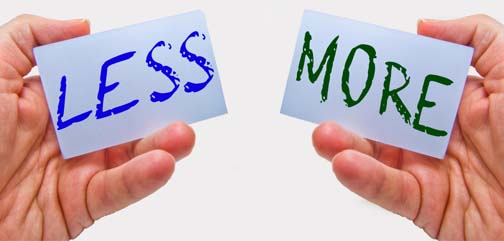What? How in the world could “less be more and more be less?”
I know this sounds ridiculous but when applied to DealDash.com and our own bidding habits this often proves to be true.
Many of us know that DealDash now has millions of customers, but to keep the math simple I will give you a ridiculously small example: Which way would DealDash make the most money? Would they make more money by selling 500 bid packs of 300 bids for $36 each or 100 bid packs of 300 bids for $60.00? If five times more people bought bid packs on sale for less that means DealDash would actually make more for (charging) less.

This kind of thinking outside the box often works well for DealDash customers, too. Let me give you an example. As a regular DealDash customer I’m using real data from this weekend just to prove this to you.
I decided to focus on the North Dakota 500 bid pack, which I bid on five times each and every time it came up for auction between yesterday and today before I finally won it.
- The first time I placed 30 bids on it Friday, Aug. 13, and I could have (and should have) easily won it because it only had 21 competitors and it sold early at only $2.98. I messed up because I allowed myself to become distracted by a phone call and failed to return to the auction in time to add more bids. How many times have you made this mistake?
- The second time the North Dakota 500 bid pack came up for auction, I was so determined to win it that I overbid and wasted 509 bids before I finally gave up. The winner of that auction overbid a lot more than I did and placed 594 bids to win the 500 bid pack. I made the mistake of competing with a competitor from one of two states I usually never compete with because those two states tend to have more than its fair share of stubborn, no-quitter over-bidders. I knew my one and only competitor was an over-bidder because I checked the “Winners’ List” and saw that same screen name consistently overbids to win. Therefore, I should have quit a lot sooner.
- The third time I used 56 bids and I could have (and should have) won it because the winner of this auction only placed 17 bids. That irritates me when the winner of the auction placed fewer bids than I did. That hardly seems fair, does it? But it was my fault because once again I allowed myself to become distracted. On the other hand, if I had been paying close attention to that auction I might have been tempted to back out of it because it had 109 competitors. It is highly unlikely for any auction to close early with that many shoppers in the auction, but this was an exception to that rule because it sold early for only $2.66.
- The fourth time I joined the auction late, shortly before the “No New Bidders” banner popped up. I used 168 bids and I was about to add a lot more bids because I was one of the final two players. However, I quickly changed my mind and canceled all my bids, purposely letting my one and only competitor win. Why? I checked the “Winners’ List” and saw that my competitor had recently won a 1,000 bid pack so I knew she had a lot more bids to burn than I did. It made more sense for me to invest in another new auction than to try to battle it out with a shopper with all those bids … and I’m sure glad I did.
- The fifth time I entered the North Dakota 500 bid pack I placed 100 bids and walked away to make dinner. When I returned to my computer a few minutes later I was so surprised and happy to see that I won this auction after using only 12 bids. It sold early for only $1.01 but because it was a 90 percent off feature I only had to pay 10 cents. Wow! What a deal! Walking away from my previous auction and placing my bids in the next auction instead was the right decision. If I had placed more bids in the fourth auction I would most likely have lost more bids and won nothing. By purposely letting my competitor win and starting a new auction, however, I ended up winning the next auction for only another 12 bids.
That certainly proves that if we are consistent and learn from our mistakes we can all become winners. It also proves that often times “More means less and less means more.”
This sponsored blog post was submitted by: Barbara L. Sellers. Barbara was compensated by DealDash for this blog post. Blog posts are written by real DealDash customers. The opinions and advice here represent our customers’ views and not those of the company.




